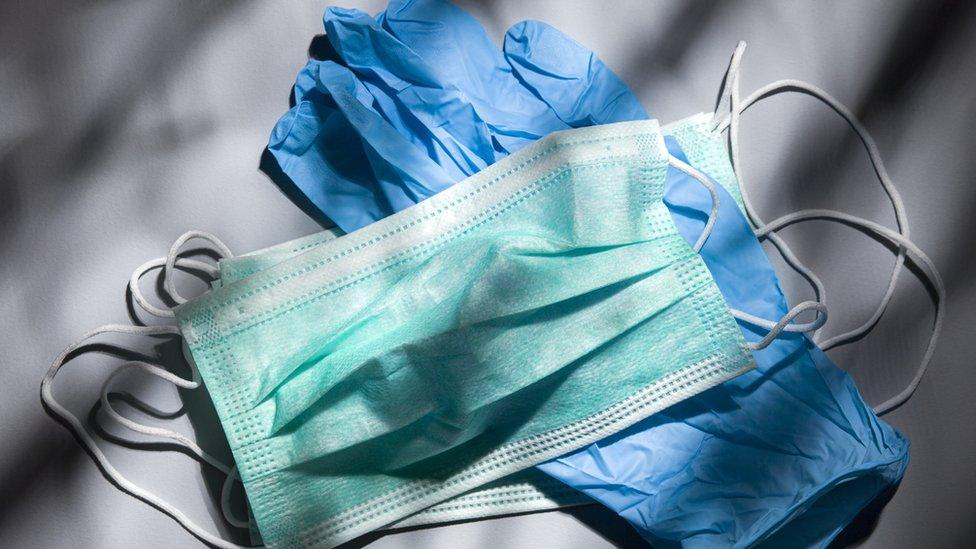Climate change: NHS staff fighting to make hospitals greener
- Published
- comments
Green groups are being run by staff to help cut emissions at hospital sites
The Welsh NHS needs to "lead by example" in the fight against climate change to avoid future health problems, say hospital staff trying to cut carbon emissions.
At Ysbyty Gwynedd in Bangor, staff are volunteering after shifts during Covid-19 to work on green schemes.
Doctors said major overhauls were needed to ensure the health service stops adding to global warming.
NHS Wales boss Dr Andrew Goodall said progress was being made.
The outgoing chief executive added that while the health service was under huge pressure, it must focus on climate change alongside the Covid crisis.
The NHS accounts for about 2.6% of Wales' emissions of planet-warming gases - a carbon footprint of approximately one million tonnes of CO2 equivalent a year.
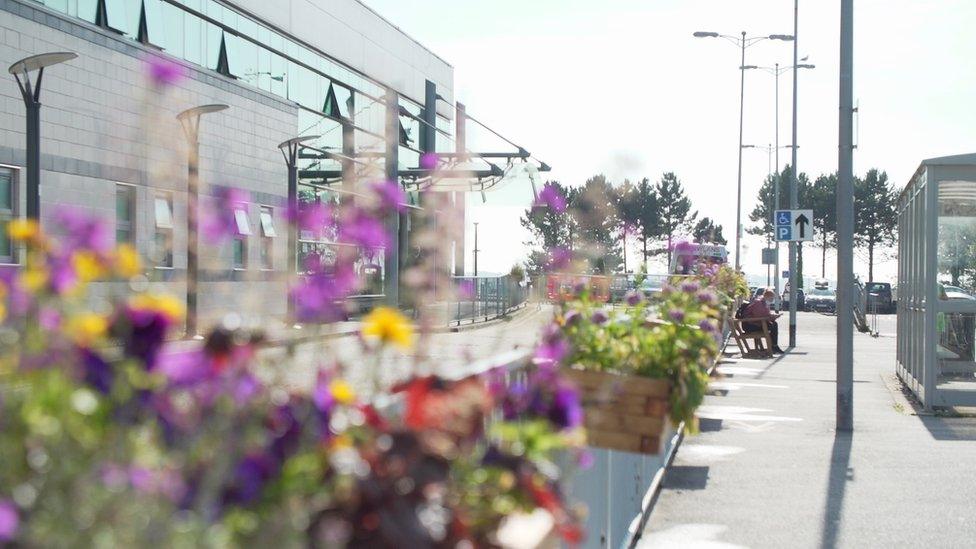
Flowers have been planted in the grounds at Ysbyty Gwynedd
At hospitals across Wales, concerned NHS staff are setting up green groups and working extra hours without pay to try and decarbonise sites.
Doctors, nurses, pharmacists and non-clinical staff at Ysbyty Gwynedd joined forces in 2019 in a bid to make the hospital run more sustainably.
The team has planted trees and wildflowers, switched to less polluting anaesthetic gases, and initiated trials of reusable personal protective equipment (PPE).
'Big commitment'
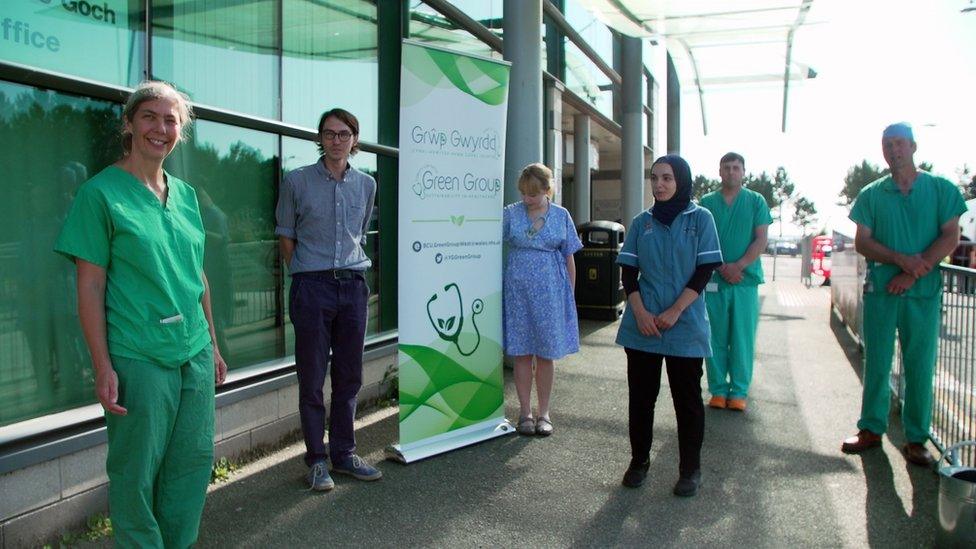
Ysbyty Gwynedd Green Group is made up of volunteers who work at the hospital
Junior doctor Tom Downs - who founded the Ysbyty Gwynedd Green Group - said it had been "something really positive to focus on" during the pandemic.
But he said for staff, who may already be working a 70-hour a week, finding time to volunteer was "a real challenge".
When BBC Wales visited the hospital, some of the staff involved came in on days off or after a night shift to show us around.
Consultant anaesthetist Dr Lisa Hancock, who has been working on biodiversity schemes, including planting a new wildflower meadow, said she wanted the planet to "be a better place" for her eight-year-old daughter.
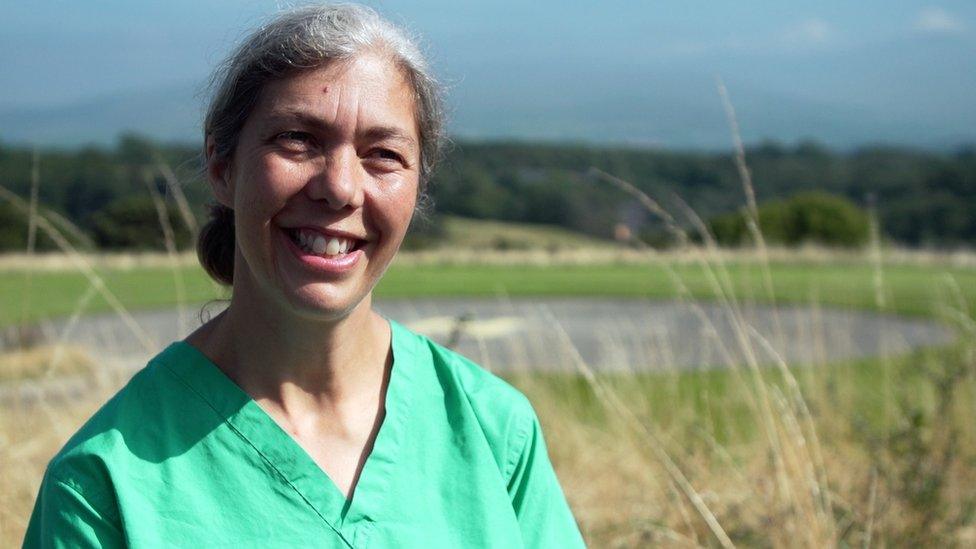
Dr Lisa Hancock said green projects could help hospital patients with their treatment
There are plans to plant 100 trees, with the idea that some of the hospital's mental health patients could help with the upkeep as part of their treatment.
"On a sunny day when you see the butterflies outside the ward, and hear the birdsong... it's harder to be sad," she said.
The group has also published cycle-to-work guides for staff to cut down on car fumes and successfully lobbied for new shower facilities.
'We'll be on the front line'
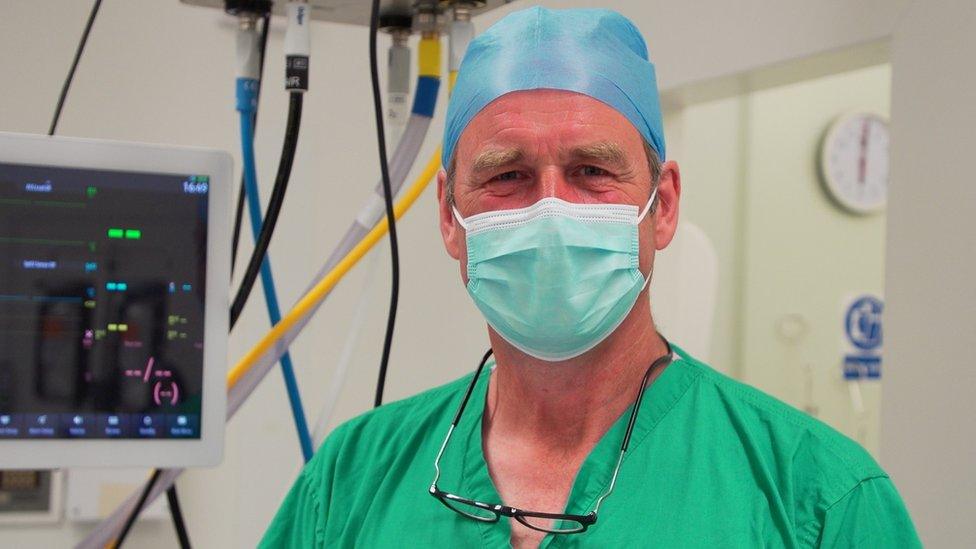
Dr Carsten Eickmann said swapping medicine used to anaesthetise patients could dramatically reduce emissions
Some of the biggest transformations have taken place inside the hospital itself, including changing the gas used to put patients to sleep.
They worked out that using Desflurane for an hour to anaesthetise a patient, generated emissions similar to driving 320km (200 miles) in a car, whereas an alternative called Sevoflurane - which worked just as well - was like driving 6.5km (4 miles).
"We're saving the equivalent of driving 27,500 miles a month," consultant anaesthetist Dr Carsten Eickmann said.
But he said the scale of the emissions cuts required to tackle climate change meant major overhauls were needed from the top.
In recent heatwaves, temperatures had reached over 30 degrees in some parts of the hospital, and old single-glazed windows and a lack of insulation on the 1980s hospital site meant huge wastage of energy, he claimed.
Dr Eickmann said there needed to be people working in the NHS specifically on its climate change response, while Dr Downs added the health service had a responsibility to "lead by example".
"Just as the health workforce are on the front lines of the pandemic, they'll likewise be on the front lines of the climate emergency and the health impacts that we see from that," he said.
'Really important'
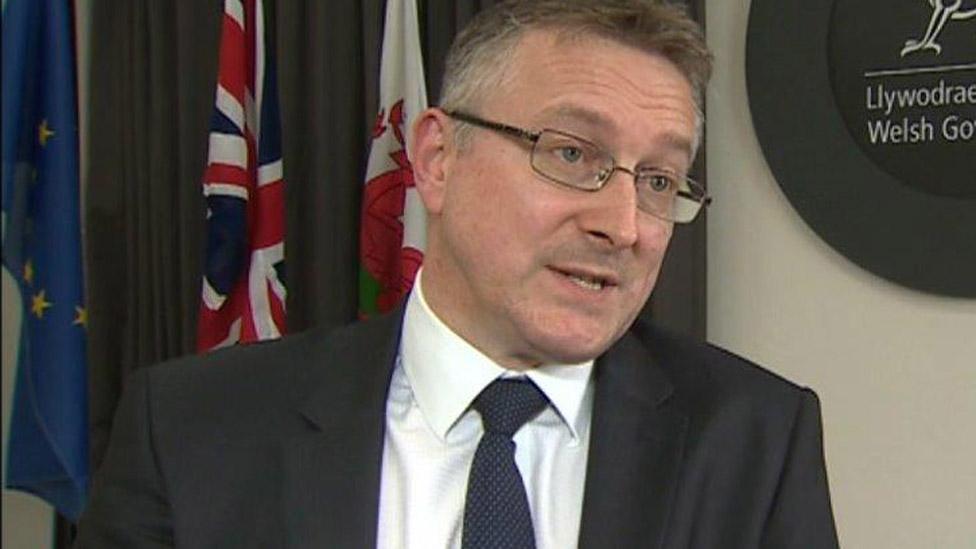
Dr Andrew Goodall became a familiar face on TV during regular briefings about Covid in Wales
Dr Goodall - who is moving to a new job as the Welsh government's top civil servant after running the NHS since 2014 - said he welcomed a "groundswell of support" from staff.
"It's really important for us to recognise that this makes a difference to healthcare for the future," he said, pointing to the link between air pollution and a variety of diseases.
"We want to make sure the NHS isn't just asking others to act - we have a responsibility to be focused [on this]."
On the calls for more action from the top, he said expectations had been set at a national level but all the different NHS organisations needed their own plans.
While the NHS was under huge pressure, Dr Goodall said focusing on climate change would help make the transformations needed to services after the Covid-19 pandemic.
"The NHS, alongside all other public services in Wales, will need to step up and increase its level of contribution over the forthcoming years," he said.
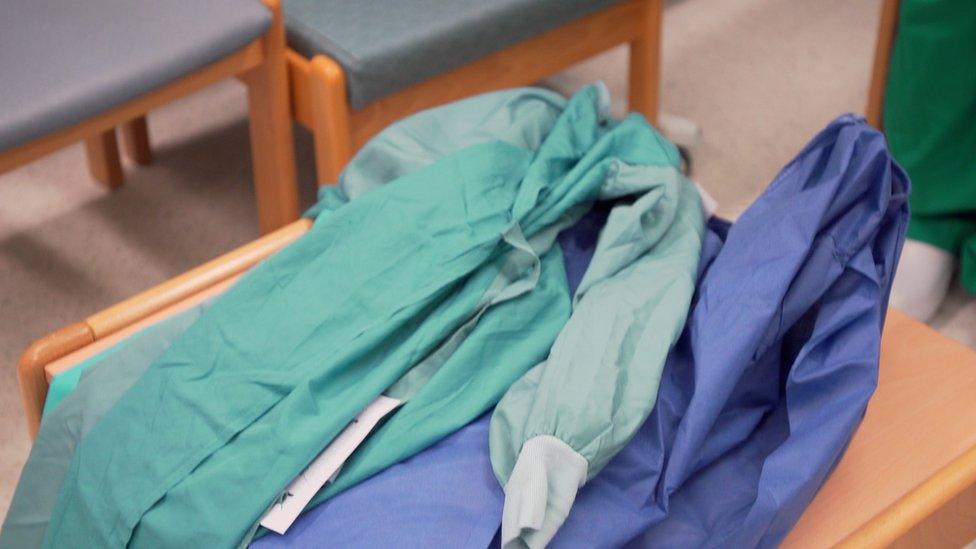
The group trialled reusable PPE
NHS Wales published its Decarbonisation Strategic Delivery Plan, external earlier this year, with targets to reduce emissions 16% by 2025 and 34% by 2030.
But the Welsh government wants the public sector as a whole to reach net zero emissions by the same year - so the document said this should be seen as a "minimum contribution" to that goal.
It proposes, among other things, that every building will have undergone an energy-efficiency upgrade with large scale renewable electricity schemes deployed and low-emission or electric ambulances procured.

DEAR MRS CAMPBELL: A letter of celebration to Wales' first black headteacher
THE CASABLANCA: How a Cardiff nightclub changed our lives

- Published6 September 2021
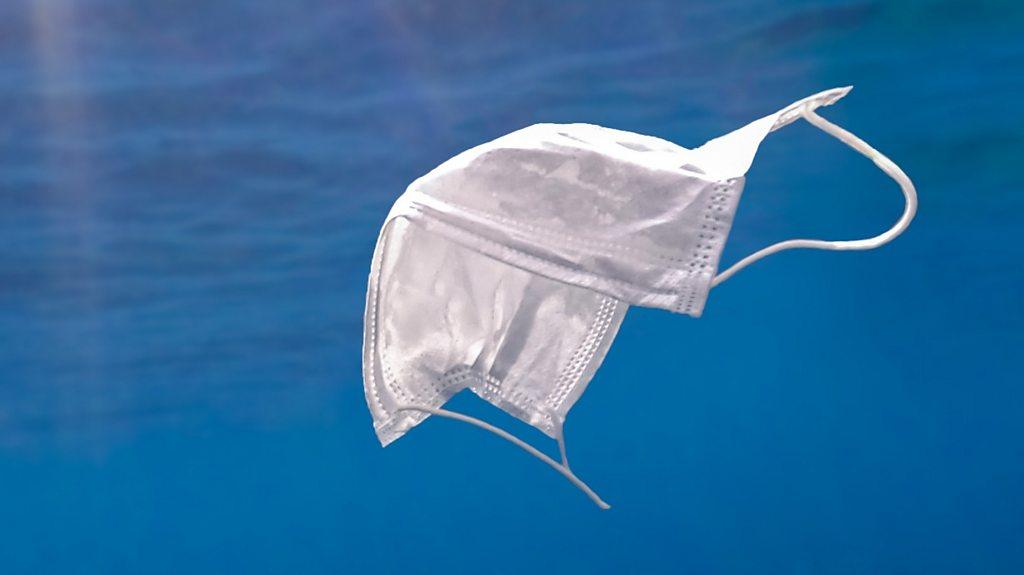
- Published9 August 2021
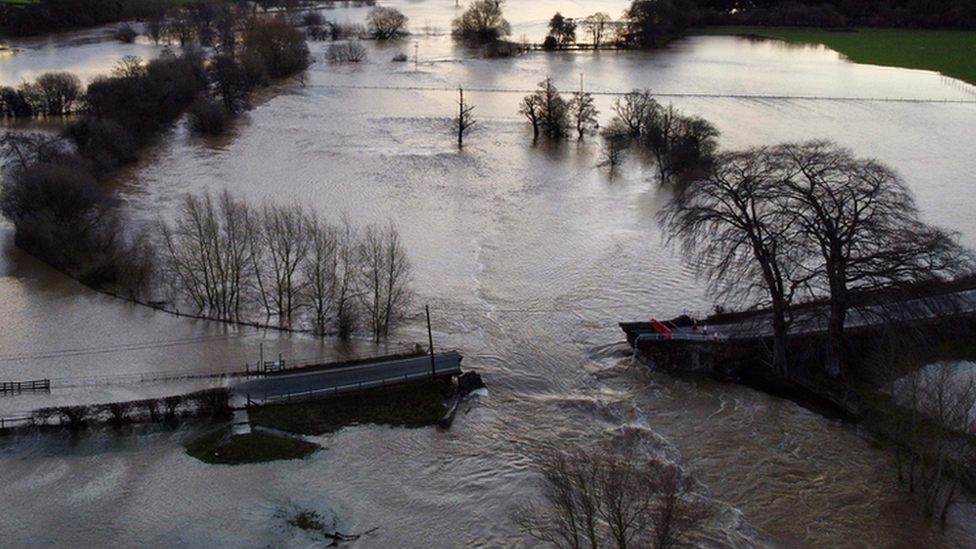
- Published27 September 2020
